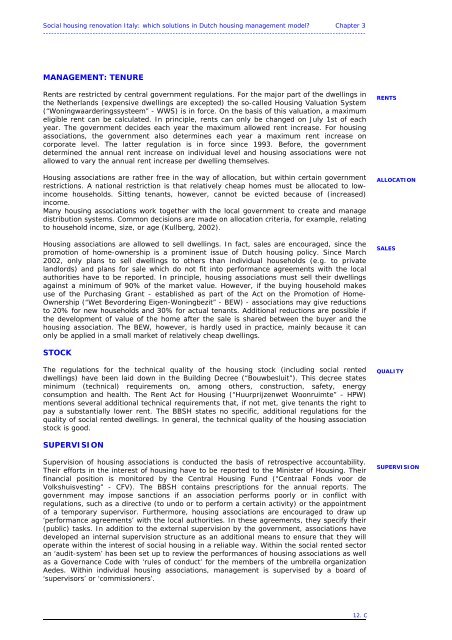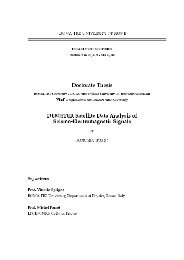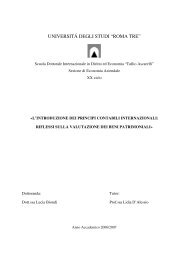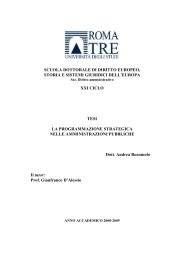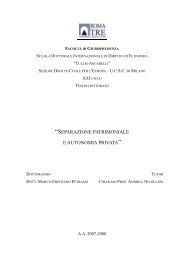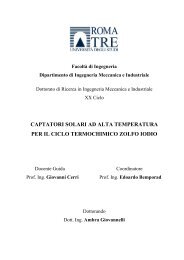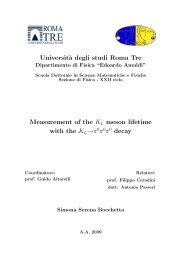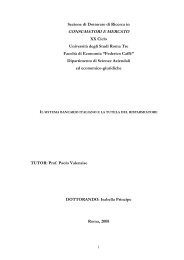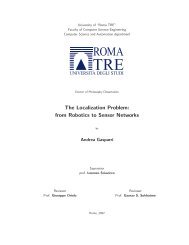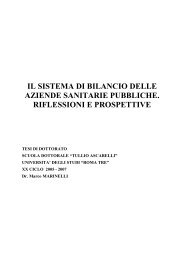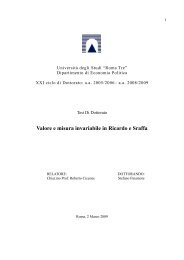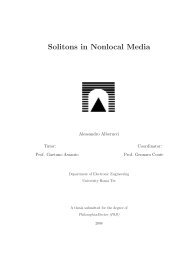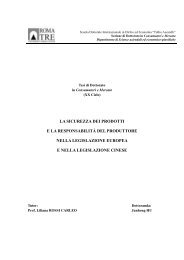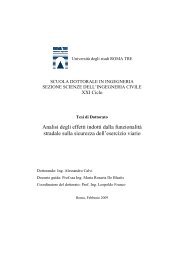intervention strategies for renovation of social housing estates
intervention strategies for renovation of social housing estates
intervention strategies for renovation of social housing estates
Create successful ePaper yourself
Turn your PDF publications into a flip-book with our unique Google optimized e-Paper software.
Social <strong>housing</strong> <strong>renovation</strong> Italy: which solutions in Dutch <strong>housing</strong> management model? Chapter 3<br />
---------------------------------------------------------------------------------------------------------------------<br />
MANAGEMENT: TENURE<br />
Rents are restricted by central government regulations. For the major part <strong>of</strong> the dwellings in<br />
the Netherlands (expensive dwellings are excepted) the so-called Housing Valuation System<br />
(“Woningwaarderingssysteem” - WWS) is in <strong>for</strong>ce. On the basis <strong>of</strong> this valuation, a maximum<br />
eligible rent can be calculated. In principle, rents can only be changed on July 1st <strong>of</strong> each<br />
year. The government decides each year the maximum allowed rent increase. For <strong>housing</strong><br />
associations, the government also determines each year a maximum rent increase on<br />
corporate level. The latter regulation is in <strong>for</strong>ce since 1993. Be<strong>for</strong>e, the government<br />
determined the annual rent increase on individual level and <strong>housing</strong> associations were not<br />
allowed to vary the annual rent increase per dwelling themselves.<br />
Housing associations are rather free in the way <strong>of</strong> allocation, but within certain government<br />
restrictions. A national restriction is that relatively cheap homes must be allocated to lowincome<br />
households. Sitting tenants, however, cannot be evicted because <strong>of</strong> (increased)<br />
income.<br />
Many <strong>housing</strong> associations work together with the local government to create and manage<br />
distribution systems. Common decisions are made on allocation criteria, <strong>for</strong> example, relating<br />
to household income, size, or age (Kullberg, 2002).<br />
Housing associations are allowed to sell dwellings. In fact, sales are encouraged, since the<br />
promotion <strong>of</strong> home-ownership is a prominent issue <strong>of</strong> Dutch <strong>housing</strong> policy. Since March<br />
2002, only plans to sell dwellings to others than individual households (e.g. to private<br />
landlords) and plans <strong>for</strong> sale which do not fit into per<strong>for</strong>mance agreements with the local<br />
authorities have to be reported. In principle, <strong>housing</strong> associations must sell their dwellings<br />
against a minimum <strong>of</strong> 90% <strong>of</strong> the market value. However, if the buying household makes<br />
use <strong>of</strong> the Purchasing Grant - established as part <strong>of</strong> the Act on the Promotion <strong>of</strong> Home-<br />
Ownership (“Wet Bevordering Eigen-Woningbezit” - BEW) - associations may give reductions<br />
to 20% <strong>for</strong> new households and 30% <strong>for</strong> actual tenants. Additional reductions are possible if<br />
the development <strong>of</strong> value <strong>of</strong> the home after the sale is shared between the buyer and the<br />
<strong>housing</strong> association. The BEW, however, is hardly used in practice, mainly because it can<br />
only be applied in a small market <strong>of</strong> relatively cheap dwellings.<br />
STOCK<br />
The regulations <strong>for</strong> the technical quality <strong>of</strong> the <strong>housing</strong> stock (including <strong>social</strong> rented<br />
dwellings) have been laid down in the Building Decree (“Bouwbesluit”). This decree states<br />
minimum (technical) requirements on, among others, construction, safety, energy<br />
consumption and health. The Rent Act <strong>for</strong> Housing (“Huurprijzenwet Woonruimte” - HPW)<br />
mentions several additional technical requirements that, if not met, give tenants the right to<br />
pay a substantially lower rent. The BBSH states no specific, additional regulations <strong>for</strong> the<br />
quality <strong>of</strong> <strong>social</strong> rented dwellings. In general, the technical quality <strong>of</strong> the <strong>housing</strong> association<br />
stock is good.<br />
SUPERVISION<br />
Supervision <strong>of</strong> <strong>housing</strong> associations is conducted the basis <strong>of</strong> retrospective accountability.<br />
Their ef<strong>for</strong>ts in the interest <strong>of</strong> <strong>housing</strong> have to be reported to the Minister <strong>of</strong> Housing. Their<br />
financial position is monitored by the Central Housing Fund (“Centraal Fonds voor de<br />
Volkshuisvesting” - CFV). The BBSH contains prescriptions <strong>for</strong> the annual reports. The<br />
government may impose sanctions if an association per<strong>for</strong>ms poorly or in conflict with<br />
regulations, such as a directive (to undo or to per<strong>for</strong>m a certain activity) or the appointment<br />
<strong>of</strong> a temporary supervisor. Furthermore, <strong>housing</strong> associations are encouraged to draw up<br />
‘per<strong>for</strong>mance agreements’ with the local authorities. In these agreements, they specify their<br />
(public) tasks. In addition to the external supervision by the government, associations have<br />
developed an internal supervision structure as an additional means to ensure that they will<br />
operate within the interest <strong>of</strong> <strong>social</strong> <strong>housing</strong> in a reliable way. Within the <strong>social</strong> rented sector<br />
an ‘audit-system’ has been set up to review the per<strong>for</strong>mances <strong>of</strong> <strong>housing</strong> associations as well<br />
as a Governance Code with ‘rules <strong>of</strong> conduct’ <strong>for</strong> the members <strong>of</strong> the umbrella organization<br />
Aedes. Within individual <strong>housing</strong> associations, management is supervised by a board <strong>of</strong><br />
‘supervisors’ or ‘commissioners’.<br />
12. C<br />
RENTS<br />
ALLOCATION<br />
SALES<br />
QUALITY<br />
SUPERVISION


